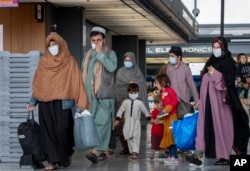The United States has announced it will end the Temporary Protected Status (TPS) for Afghans, a move that will leave thousands at risk of deportation to Taliban-controlled Afghanistan.
The Department of Homeland Security (DHS) declared on May 12 that TPS for Afghanistan will expire on July 14, with the decision affecting an estimated 9,000 to 12,000 Afghans currently living and working legally in the United States under this program.
However, rights groups and Afghan refugees have condemned the decision, warning that it puts lives in jeopardy and ignores the realities on the ground.
Seeking Safety In The US
The DHS said in its statement that the termination of TPS is based on its assessment that conditions in Afghanistan have "improved sufficiently" and no longer meet the statutory requirements for TPS.
The statement said DHS Secretary Kristi Noem had also determined that permitting Afghan nationals to remain temporarily in the United States is "contrary to the national interest of the United States."
The department cited national security and fraud concerns, claiming some individuals under TPS are being investigated for threats to public safety and national security.
But Afghans living in the United States under TPS say they will be in danger if they return to Afghanistan.
"It is true that there is relative security, but there are many problems," an Afghan man who spoke on condition of anonymity told RFE/RL's Radio Azadi.
"Right now, former government soldiers are being arrested, disappeared, and even killed," said the man, who lives in Texas with his family of four.
Another Afghan national who moved to the United States four years ago echoed the same sentiment.
"If we are sent back, our lives will be at risk because we worked in the previous government and the current government still wants revenge," he told Radio Azadi. "We came to the United States for our safety, and now that this program is ending it will create many problems."
These fears are rooted in the dramatic changes Afghanistan has undergone since the Taliban's return to power in 2021. Following the withdrawal of US and NATO troops, Taliban insurgents seized Kabul, toppling the Western-backed Afghan government.
Since then, the Taliban has imposed a strict interpretation of Islamic law, rolling back rights and freedoms, especially for women and girls, who are now barred from secondary education and most employment.
Reports from the UN and human rights organizations have documented widespread human rights abuses, including extrajudicial killings, enforced disappearances, torture, and public floggings, particularly targeting former government officials, security personnel, and dissenters.
'Unconscionable' To Deport Afghans
Human rights organizations such as Human Rights First, the International Rescue Committee (IRC), World Relief, and others have condemned the move, warning it puts thousands of Afghans at risk of deportation to a country where they could face persecution, torture, or even execution under Taliban rule.
"For the Trump administration to claim that conditions in Afghanistan have improved enough to justify returning people is simply unconscionable and divorced from reality," said Eleanor Acer, senior director of global humanitarian protection at Human Rights First.
Unless a court intervenes, the termination of TPS for Afghans will proceed as scheduled in July, leaving thousands facing an uncertain -- and potentially dangerous -- future under Taliban rule.
"People with TPS are valuable members of American communities, schools, and workplaces," IRC wrote in a statement. "We urgently call on the US government to reconsider this harmful policy change and maintain this life-saving humanitarian protection for people from Afghanistan."












